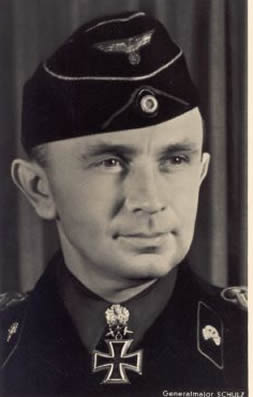Schulz, Adelbert
- Date of birth:
- December 20th, 1903 (Berlin/Brandenburg, Germany)
- Date of death:
- January 28th, 1944 (Shepetovka/Khmelnitsky Oblast, Soviet Union)
- Nationality:
- German (1933-1945, Third Reich)
Biography
Adelbert Schulz was born on December 20th, 1903 as the son of a civil worker. At first he studied for a career to be banking director, but in 1925 he changed his career to the Polizei. He transferred to the Wehrmacht on October 1st, 1935.
According to several sources his first name is written as Adelbert. The Volksbund however has him in their database as Adalbert.
Promotions:
December 20th, 1925: Polizeianwärter;
1927: Polizeiwachtmeister;
April 20th, 1934: Polizeileutnant;
October 1st, 1935: Oberleutnant;
1940: Hauptmann;
January 1st, 1942: Major;
January 1943: Oberstleutnant;
November 1st, 1943: Oberst;
January 1st, 1944: Generalmajor;
Career:
?: Berliner Realgymnasium;
?: Bankangestellter;
1923 - 1924: Hanselshochschule;
December 20th, 1925: Preußischen Kasernierten Landespolizei;
December 1925 - 1927: Polizeischule Brandenburg;
October 1st, 1935: Wehrmacht;
October 12th, 1937: Chef 1. Kompanie, Panzer-Regiment 25;
?: Chef I. Abteilung, Panzer-Regiment 25;
June 6th, 1940: Kommandeur I. Abteilung, Panzer-Regiment 25;
March 5th, 1943: Kommandeur Panzer-Regiment 25;
January 1st, 1944 - January 26th, 1944: Urlaub;
January 26th, 1944 - January 28th, 1944: Kommandeur 7. Panzer-Division (appointed January 1st, 1944).
Do you have more information about this person? Inform us!
- Period:
- Second World War (1939-1945)
- Rank:
- Hauptmann (Captain)
- Unit:
- 1. Kompanie, I. Abteilung, Panzer-Regiment 25, 7. Panzer-Division, Heer
- Awarded on:
- May 24th, 1940
- Period:
- Second World War (1939-1945)
- Rank:
- Hauptmann (Captain)
- Unit:
- 1. Kompanie, I. Abteilung, Panzer-Regiment 25, 7. Panzer-Division, Heer
- Awarded on:
- May 29th, 1940
- Period:
- Second World War (1939-1945)
- Rank:
- Hauptmann (Captain)
- Unit:
- Chef, I. Abteilung, Panzer-Regiment 25, 7. Panzer-Division, Heer
- Awarded on:
- September 29th, 1940
226th Heer Award.
- Period:
- Second World War (1939-1945)
- Rank:
- Hauptmann (Captain)
- Unit:
- Kommandeur, I. Abteilung, Panzer-Regiment 25, 7. Panzer-Division, Heer
- Awarded on:
- December 31st, 1941
47th Award.
- Period:
- Second World War (1939-1945)
- Rank:
- Oberstleutnant (Lieutenant-colonel)
- Unit:
- Kommandeur, Panzer-Regiment 25, 7. Panzer-Division, Heer
- Awarded on:
- August 6th, 1943
In addition to this notable success, Schulz and his regiment were also able to destroy a total of 76 enemy tanks over the course of 11 days of battle in the attempted attack towards Kursk. In recognition of these achievements, Schulz would receive the Swords to his Knight's Cross.
33rd Award.
- Period:
- Second World War (1939-1945)
- Rank:
- Oberst (Colonel)
- Unit:
- Kommandeur, Panzer-Regiment 25, 7. Panzer-Division, Heer
- Awarded on:
- December 14th, 1943
9th Award.
- Period:
- Second World War (1939-1945)
- Rank:
- Generalmajor (Brigadier)
- Unit:
- Kommandeur, 7. Panzer-Division, Heer
- Awarded on:
- January 30th, 1944
"The commander of an armoured division major general Schulz, who received the highest award for bravery from the Führer a few days ago, found at the head of his division a heroic death in this combat. With him the army loses one of his best officers, the armoured force an exemplary commander."
- Period:
- Second World War (1939-1945)
Sources
- Photo: Wilco Vermeer collection, the Netherlands
- - FEDERL, CH., Die Ritterkreuzträger der Deutschen Panzerdivisionen 1939-1945, VDM Heinz Nickel, Zweibrücken, 2000.
- FELLGIEBEL, W.P., Elite of theThird Reich, Helion & Company Limited, Solihull, 2003.
- MANTEUFFEL, H. VON, Die 7. Panzer-Division, Podzun-Pallas-Verlag GmbH, Wölfersheim-Berstadt, 1978.
- THOMAS, FRANZ & WEGMANN, GÜNTER, Die Eichenlaubträger 1940-1945, Biblio-Verlag, 1998.
- WILLIAMSON, G., Knight's Cross With Diamonds Recipients: 1941-45, Osprey Pub Co., 2006.
- Kwasny A., Kwasny G., Die Eichenlaubträger 1940-1945 (CD), Deutsches Wehrkundearchiv, Lage-Waddenhausen, 2001
- Berger, F., Mit Eichenlaub und Schwertern – Die höchstdekorierten Soldaten des Zweiten Weltkrieges, Selbstverlag Florian Berger, Wien, Österreich, 2002/03
- Helden der Wehrmacht, Sammelband (Miscellany), FZ-Verlag GmbH, München, Deutschland, 2000
- Lexikon der Wehrmacht











